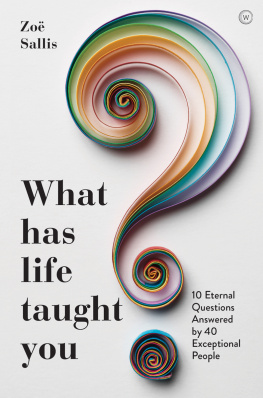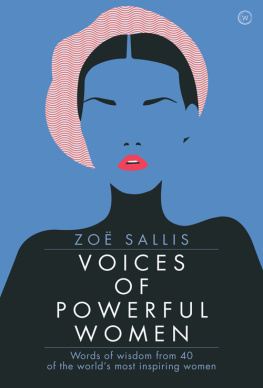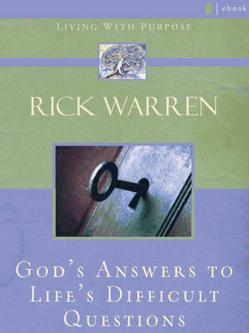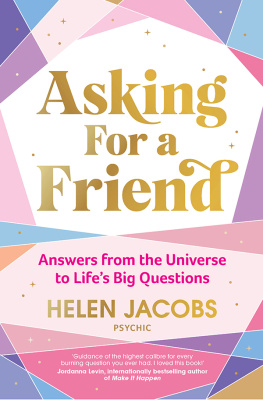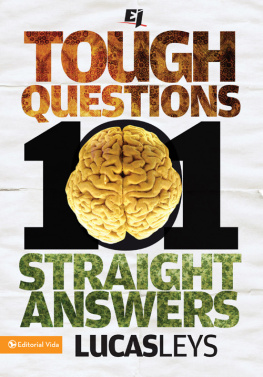


First published in the UK as Ten Eternal Questions in 2012 by
Duncan Baird Publishers Ltd.
This edition published in the UK and USA in 2020 by Watkins, an imprint of Watkins Media Limited
Unit 11, Shepperton House
89 Shepperton Road
London
N1 3DF
Copyright Watkins Media Limited 2020
Text Copyright Zo Sallis 2020
Zo Sallis has asserted her right under the Copyright, Designs and Patents Act 1988 to be identified as the author of this work.
All rights reserved.
No part of this book may be reproduced or utilized in any form or by any means, electronic or mechanical, without prior permission in writing from the Publishers.
1 2 3 4 5 6 7 8 9 10
Designed and typeset by Lapiz
Printed and bound in the UK by TJ International Ltd.
British Library Cataloguing-in-Publication Data Available
Extracts from The Dalai Lamas Book of Wisdom by the Dalai Lama and editor Michael E. Bunson published by Rider. Used by permission of The Random House Group Limited.
ISBN: 978-1-7867-8350-9
www.watkinspublishing.com

ABOUT THE AUTHOR
Zo Sallis was born in India and educated in England, attending Cheltenham Ladies College. After college she won a scholarship to Webber Douglas Academy of Dramatic Art, and went on to act in theatre, TV, and film.
In 1962 Zo moved to Rome with her great love and partner John Huston, the film director, and it was here that she brought up Danny, their son.
Danny Huston is now a well known actor and director in his own right.
Zo currently lives in Berkshire. She is the author of Voices of Powerful Women, also published by Watkins.
DEDICATION
To John and Danny.
Love is not love
Which alters when
it alteration finds,
Or bends with the remover
to remove:
O, no! it is an ever-fixd mark
That looks on tempests
and is never shaken.
WILLIAM SHAKESPEARE
CONTENTS

?
INTRODUCTION
The most beautiful experience you can have is a sense of the mysterious. It is the fundamental emotion that stands at the cradle of true art and true science. Whoever does not know it and can no longer wonder, no longer marvel, is as good as dead, and his eyes are dimmed.
Albert Einstein
Socrates thought the unexamined life was not worth living. Perhaps that is why he roamed the streets of Athens accosting people and asking them their thoughts and beliefs on a whole range of subjects. But how many people nowadays would agree with Socrates that discussing ideas is the mark of a civilized society? Philosophical and ethical questions often seem to fade from our minds once we have left behind the youthful stage of sitting with friends arguing all night about every topic under the sun.
I used to love doing that. I still do. And it was while my son Danny and I were tossing back and forth ideas about life that the idea for this book emerged. It struck me that it might be fascinating to put some fundamental questions to people from different walks of life who were in the public eye yet might never before have been asked to give their views on such subjects.
I began interviewing people for the book almost 20 years ago. It has been a long journey and a great experience. I remember one magical interview sitting on a tree-shaded wooden bench in the foothills of the Pyrenees, the air filled with birdsong. Another in an exquisite apartment in Paris. Others in a museum in Israel, surrounded by sculptures, with waves crashing on the rocks below; in a spiritual centre; a mosque in London; in a grand old villa in Cuba; in homes in the Hollywood hills, artists studios and on the windswept sands of Los Angeles Venice Beach. And I will never forget driving in Cape Town to interview Nelson Mandela and seeing his prison, Robben Island, in the distance.
People sometimes find questions about their deepest beliefs quite disconcerting. I can only marvel and be thankful that so many people were willing to respond to that challenge and able to be so extraordinarily encouraging when I turned up to see them. I appreciated the responses of people I had never met before, such as Charles Le Gai Eaton, a writer and authority on Islam, who, in my first rather raw attempt at interviewing, gave me the benefit of his experience, intelligence and sensitivity. And also all the responses of people I have known for very many years. The only responses included here which are not the result of a personal interview are those from His Holiness the Dalai Lama. I contacted his office, who directed me to relevant passages from his teachings, and then I sought permission from the publishers to include them here.
I thought most people would be interested in the answers to the following 10 questions:
What is your concept of God?
In the East they often say that God is nearer to us than breathing. Is this sense of natural affinity with a higher power very far from what science is now starting to tell us: that human beings may be programmed to believe in God, and that there could be an evolutionary advantage in having a brain with the capacity to believe in God? Could this belief be a reality, not just a concept?
Do you think this life is all there is, or do you believe in an afterlife?
Do we have a soul and does that soul exist after our bodily death? Might there be not only an afterlife but also a whole series of material reincarnations? Or, as some physicists conjecture, is it possible that multiple variations of ourselves exist simultaneously in parallel universes?
Do you accept the concept of karma, in the sense of cause and effect?
Isaac Newton, in his third law of motion, describes the principle that for every action there is an equal and opposite reaction. To what extent does the inexorable law of karma, that we reap what we have sown, apply to our conduct in this life, or other lives?
What is your moral code, in relation to right and wrong?
Ethics, conscience, guilt, education, spirituality, listening to the still voice within how do we determine a moral code for ourselves? What guides us, what yardstick can we use when morals change so much from century to century and even from year to year?
Do you believe you have a destiny, and do you see yourself as here to fulfil it?
Are our destinies pre-ordained? Do we have only conditioned free will, or do we create our own destiny in the here and now, subject to certain limitations (and capabilities) inherent in some individuals DNA?
What has life taught you so far?
Life is lived forwards but understood backwards, said Nietzsche. Do we begin to understand more about life only as we grow older?
What advice or words of wisdom would you like to pass on to those close to you?
Is fear of the Lord the beginning of wisdom, as the Bible tells us? To what extent should we give advice to other people, and will they take it?
Do you believe our survival on planet Earth is being threatened?
Is Zac Goldsmith, former editor of the Ecologist magazine, correct in thinking that without an immediate change in our ways, humankind could disappear very soon? Or are there already positive signs of change and grounds for optimism in our historical ability to adapt and survive?
Next page
